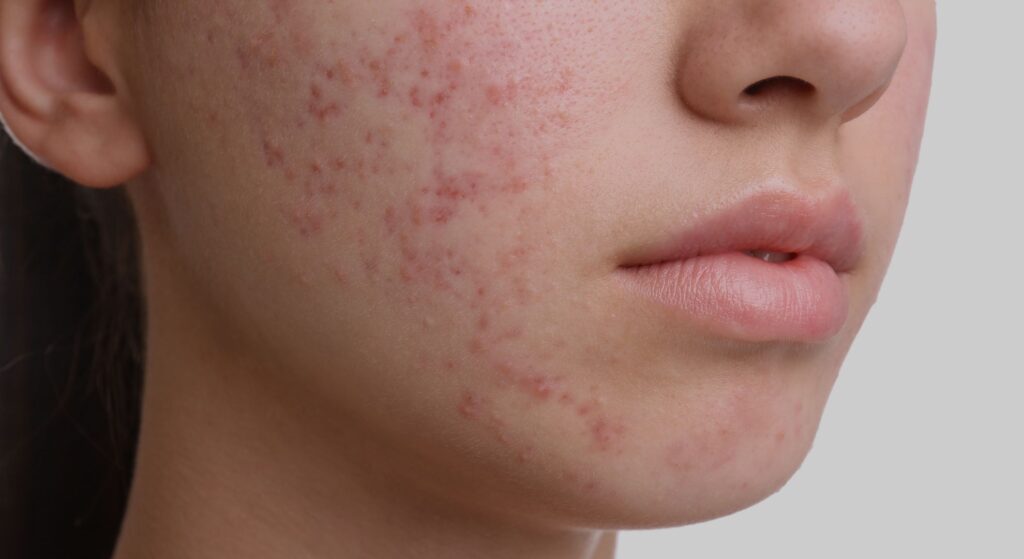What Causes Acne Breakouts?
There are many different reasons why our skin breaks out, which is the primary reason for frustration with acne. Here are a few common triggers for acne breakouts:
- Excess production of oil
- Hair follicles clogged by oil and dead skin cells
- Bacteria
- Excess activity of hormones
- Certain prescription medications (corticosteroids, testosterone, lithium)
- Poor diet
- Stress
Acne Risk Factors
Acne doesn’t discriminate, making anyone susceptible to it. However, there are several contributing risk factors that could make one individual more prone to breakouts than another. These risk factors include:
- Age: People of all ages can get breakouts, but it is most common in teenagers as young men and young ladies begin going through puberty.
- Hormonal changes: Hormones play a significant role in causing acne, which is why it is so common in teenagers. Additionally, women could experience breakouts during pregnancy, taking oral contraceptives, and around the time of their menstrual cycles as estrogen and testosterone levels fluctuate.
- Genetics: If you have a family history of problematic acne, this is a tell-tale sign of whether or not you will have issues with acne, too.
- Friction/pressure on the skin: Talking on the phone, wearing a helmet, and tight-fitting clothes apply pressure onto the skin, irritating it enough to cause acne.
- Greasy substances: When your skin comes in contact with with oily lotions or other greasy surfaces and environments (such as a restaurant kitchen), your skin could react and breakout several days after the contact was made.
Acne Treatments
Acne is the most common skin condition that people of all ages struggle with regularly. Although acne is common, treatment can be tricky because of the many different causes.

Acne makes an appearance when the pores in our skin is clogged. Clogged pores begin with dead skin cells that do not shed from the surface of the skin. The body naturally produces sebum oil that prevents our skin from drying out, and when the dead skin cells don’t shed from the skin’s surface, they stick together inside the pore. Some skin types have bacteria that live on the skin that will also get clogged inside the pore—thus, the perfect environment to breed more bacteria very quickly, causing the pore to become inflamed, which results in painful, red, swollen cystic acne.
As previously mentioned, not every skin type is exactly the same, and not all acne treatments are the same. For this reason, the dermatologists at K2 Dermatology encourage patients who suffer from troublesome acne to contact our Boulder skin care clinic to schedule a consultation prior to making an appointment and allow the experts to determine the best skin regimen for you.

When you make an appointment at our Boulder-based dermatology clinic, a dermatologist will evaluate blemishes and bumps to properly diagnose it as acne. Then the physician will note the type of acne and grade its severity. At this point, the dermatologist will make a treatment recommendation that is best suited for your skin type.
It’s important to understand that simply treating acne does not deliver results overnight. Depending on the type of acne, the dermatologist could recommend a series of services to effectively treat and eliminate acne.
In order to achieve clearer skin, you can expect any of the following treatment options:
Topical acne solutions: Acne creams, gels, and/or cleansers are commonly used to treat acne blemishes and breakouts. Some topical treatments are used to kill bacteria while others will work to reduce oil. The most common topical acne treatments contain a retinoid, benzoyl peroxide, antibiotic, or salicylic acid.
Oral acne solutions: Your dermatologist may prescribe one or more acne medications that are taken orally, allowing it work throughout the entire body. This method may only be necessary for large, red, swollen types of blemishes. Antibiotics, birth control pills, and isotretinoin are a few types of medications your dermatologist could prescribe.
Dermatology services that treat acne include:
- Lasers and light therapies (intense pulsed light/IPL)Laser therapy removes excess oil and dead skin cells from clogged pores. This treatment is not recommended for cystic or nodular acne.
- Chemical peelsThere are many benefits of chemical peels and have been shown to be highly effective to treat acne as well as improve the overall appearance of the skin.
- ExtractionsThe name does exactly what it says. A dermatologist will drain and extract the built-up fluid from the acne bump. This procedure accompanies many skin care treatments but it can be done as an isolated treatment if necessary.
If you are unsure about the best acne treatment you need, contact K2 Dermatology and schedule a consultation with our experienced dermatologists!
